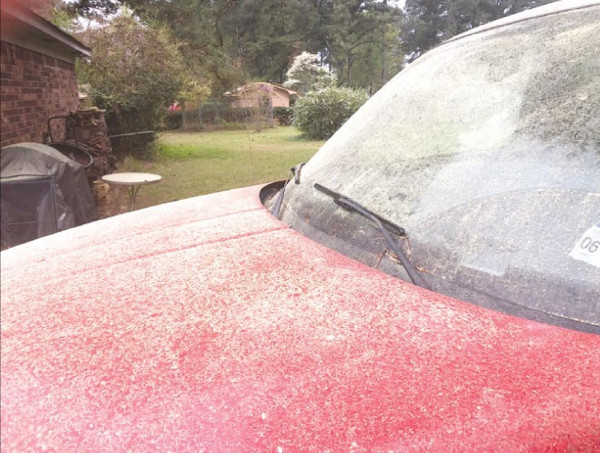Pollen thickens concerns

A thick layer of pine pollen covered vehicles throughout much of Lincoln Parish early Thursday morning. Leader photo by T. SCOTT BOATRIGHT
When it comes to trying to stay feeling well, times are pretty tough right now.
Lifestyles have been changed by the coronavirus outbreak currently gripping our country as a whole.
The state of Louisiana also remains in the midst of a highlevel flu outbreak.
And now, pollen is raining down, covering area sidewalks, streets and vehicles while also affecting the way many of people feel.
According to the annual AccuWeather spring allergy forecast — and spring officially started Thursday — a brutal allergy season is ahead for allergy sufferers. In Louisiana, the forecast calls for an above-average season.
And all one has to do in Lincoln Parish right now is to look around and realize it’s already here.
The yellow pollen coating most things in the piney hills of Lincoln Parish right now comes from the pine trees here. It’s easy to see because that yellow pine pollen is bigger and more noticeable. But other pollens are much smaller and are what normally cause allergic reactions.
And with an earlier arrival than normal for a second straight year, pollen has already started to affect the everyday lives of many that have seasonal allergies here in Lincoln Parish.
While there have been no cases reported here locally, the current coronavirus outbreak affecting the country has many people on edge. So when they start sneezing or developing a tingle in the back of their throat or start coughing, it’s easy to become concerned.
But there are definite differences between the current coronavirus, COVID-19, and simple allergies.
According to the U.S. Centers for Disease Control and Prevention, symptoms of COVID-19 are fever, cough, and shortness of breath.
And according to the Mayo Clinic, symptoms of seasonal allergies are sneezing, itching of the nose, eyes or roof of the mouth, runny, stuffy nose and watery or red eyes.
Some less common coronavirus symptoms include: aches and pains, nasal congestion, runny nose, sore throat or diarrhea, according to the World Health Organization.
The main difference that stands out between coronavirus symptoms and those of seasonal allergies is that coronavirus can cause a fever; allergies cannot, said Marc Goldstein, an internationally recognized allergy and asthma specialist.
“With COVID-19 respiratory illness, people typically have fever with coughing and shortness of breath, so fever is a big distinction,” Goldstein said.
“Another major distinction is that allergies will also come with some level of itchiness, while coronavirus will not. And while sneezing can occur in both conditions, those with allergies often suffer more from nasal issues. With allergies, people often have bouts of sneezing where you just can’t stop. People with coronavirus are showing less of that incessant sneeze so it’s more infrequent.”
Goldstein noted that allergy sufferers should be familiar with their symptoms.
“They come to expect the pattern of how symptoms flow from allergies to their chest,” Goldstein said. “Someone with coronavirus would have a different pattern and the cough or sneeze may even feel different.”
People with asthma should be some of the most vigilant in taking precautions against contracting the coronavirus according to the American College of Allergy, Asthma and Immunology.
It’s important for those with the condition should keep their asthma well-controlled and continue taking their medications the ACCAII said. No asthma medications -- including inhaled corticosteroids and biologics — have been shown to increase the risk of getting COVID-19, according to the ACAAI.
Other people at higher risk from the coronavirus include the elderly, and people with immunodeficiency or other chronic conditions that weaken the immune system according to health officials.

